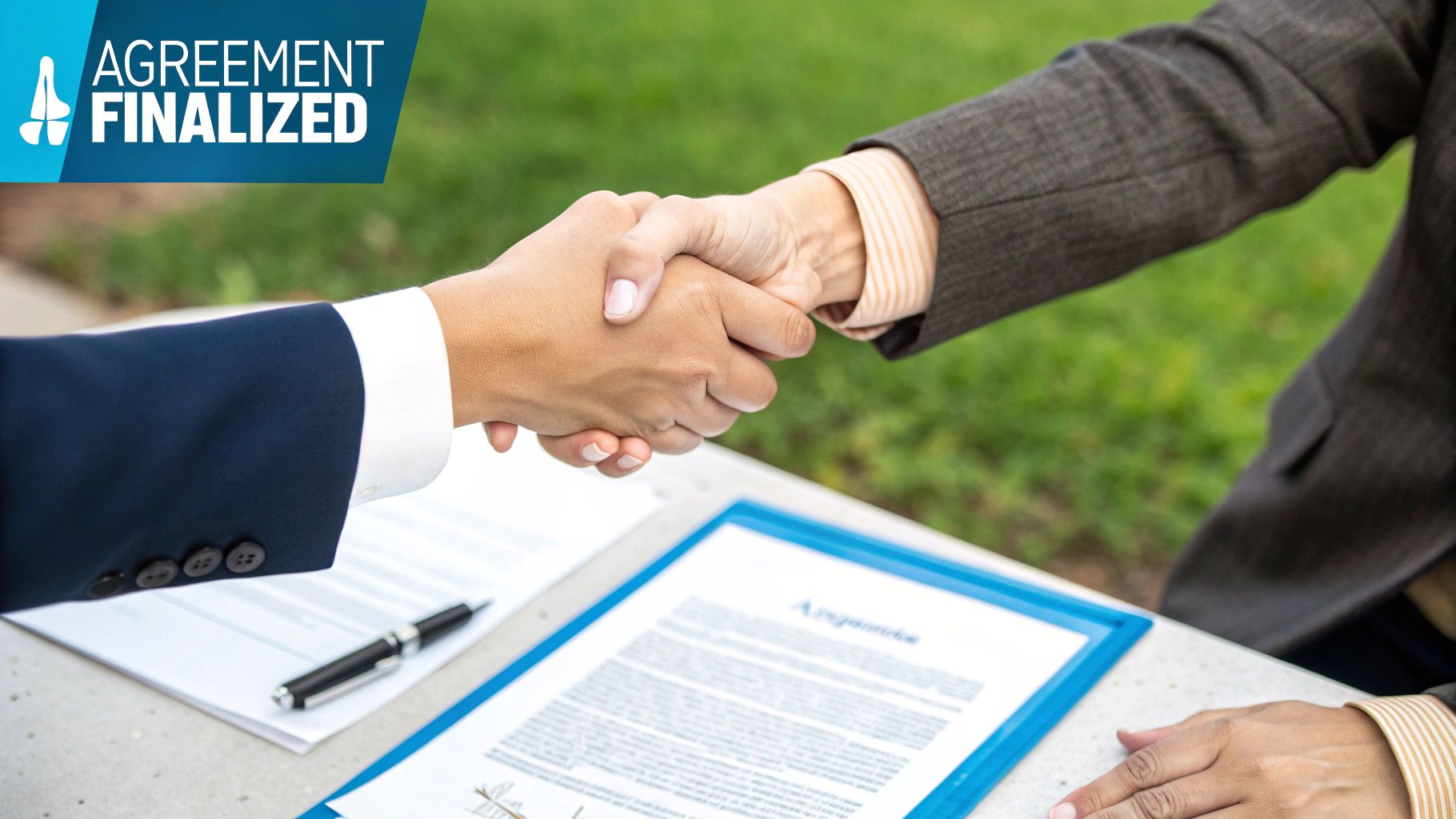Reading the Room: What's Really Happening in Today's Market

Winning a lease renewal negotiation isn't about being the most demanding person in the room; it’s about truly understanding the current market. The days of just asking for a better rate and hoping for the best are over. Success now hinges on grasping the subtle, often unseen, economic forces that give you actual leverage. Ever wonder why some tenants secure great deals while others just sign what's put in front of them? The difference is often their ability to read the economic tea leaves.
This means you have to look past the advertised rental prices in your neighborhood. You need to investigate what’s really influencing decisions. For example, is your landlord feeling the heat to refinance their property portfolio? Are vacancy rates in your specific area slowly rising, even if city-wide numbers look healthy? Finding the answers to these questions gives you a real leg up.
Understanding Your Landlord's Position
Every landlord operates under a different set of pressures and goals. A major real estate investment trust (REIT) might be obsessed with maintaining high occupancy rates to please shareholders. On the other hand, a smaller, family-run business might be more focused on steady cash flow to cover their mortgage. Figuring out these underlying motivations is crucial for framing your negotiation.
Think about what might be on your landlord's mind:
- Vacancy Costs: The money it takes to find a new tenant—covering marketing, the downtime between tenants, and potential renovations—adds up fast. A vacant unit represents zero income but still racks up expenses, which makes a dependable, renewing tenant extremely valuable.
- Market Competition: Are new apartment buildings or commercial spaces opening up nearby? A flood of new inventory can make landlords more willing to negotiate to keep good tenants from jumping ship.
- Financing and Debt: Landlords with big loans coming due or those with variable-rate debt are often eager to lock in stable, long-term tenants to keep their lenders happy.
Why Timing Is Your Secret Weapon
The timing of your lease renewal negotiation is a powerful strategic tool, and it goes far beyond the standard 90-day notice period. This shift is mirrored in broader market trends. The lease management sector, which covers these negotiations, was valued at USD 5.4 billion in 2022 and is expected to almost double by 2032. This growth highlights a definite move toward more strategic, data-informed leasing. You can explore the full research on lease management trends to see how the pros are adjusting their strategies.
By starting renewal talks during a typically slow leasing season or when you know your landlord is dealing with portfolio-wide pressures, you can completely alter the dynamic. This can create opportunities for concessions that might not have been on the table just a few months earlier.
Playing the Long Game: Strategic Preparation That Pays Off
 Many tenants think a lease renewal negotiation is a quick conversation that happens 90 days before the lease is up. In reality, it’s more of a marathon than a sprint. The smartest renters know that building a strong case for themselves starts the day they move in. This isn't about being confrontational; it's about consistently proving your value as a tenant and keeping the receipts to prove it. A great rental history is your most powerful tool, turning a potentially tense chat into a productive partnership.
Many tenants think a lease renewal negotiation is a quick conversation that happens 90 days before the lease is up. In reality, it’s more of a marathon than a sprint. The smartest renters know that building a strong case for themselves starts the day they move in. This isn't about being confrontational; it's about consistently proving your value as a tenant and keeping the receipts to prove it. A great rental history is your most powerful tool, turning a potentially tense chat into a productive partnership.
Think about it from your landlord’s perspective. They aren't just giving you a place to live; they're managing a major financial asset. Your goal is to show them that you make that asset more valuable and less of a headache. This goes beyond simply paying rent on time. It means clear communication, keeping good records, and building a positive relationship that will benefit you when it’s time to talk about a new lease. You want to be seen as a low-maintenance, high-value partner, not just another occupant.
Building Your Tenant "Resume"
Your time in the property is like a professional resume, so you should treat it with the same care. Every responsible action and friendly interaction builds your credibility. When it’s time to negotiate, having a detailed log of your tenancy will be your secret weapon.
Your record should highlight things like:
- Prompt Payments: This is the absolute foundation of your case. A flawless, documented history of on-time payments is non-negotiable.
- Property Upkeep: Did you handle minor repairs yourself (with permission, of course) or make small improvements? Keep a list.
- Positive Communication: Save those professional, courteous emails. This shows you’re reasonable and easy to work with—a quality property managers love. We talk more about what property managers look for when retaining long-term tenants in our guide.
Conducting Your Own Strategic Review
Just like a company evaluates its performance, you should take stock of your own tenancy from time to time. To get a clear picture of your position, you could try a simple framework like a SWOT analysis. This helps you map out your Strengths (perfect payment history), Weaknesses (maybe you were a bit slow on a maintenance request once), Opportunities (are vacancy rates rising in your neighborhood?), and Threats (is a new luxury building opening nearby?). This approach helps you build a solid story around your value.
Giving your landlord a heads-up that you'd like to renew is a smart move. It provides both of you with plenty of time to discuss the terms without the pressure of a fast-approaching deadline, which always makes for a better conversation. By showing you’re prepared and committed, you set a professional tone right from the beginning. You can discover more insights on strategic lease communications to sharpen your approach.
Perfect Timing: When to Make Your Move for Maximum Leverage
In a lease renewal negotiation, the difference between a good deal and a great one often comes down to one simple thing: timing. Starting the conversation at the right moment can completely shift the power dynamic in your favor. This goes beyond simply meeting the 90-day notice period; it’s about strategically picking your moment based on what's happening in the market and with your landlord's own business pressures.
Decoding Market Cycles and Seasonal Lulls
Take a moment to think about your local rental market. When is demand at its highest? For most places, it's during the warmer spring and summer months. On the flip side, the market tends to cool down significantly in the fall and winter. Kicking off your negotiation during these slower periods can give you a real edge. With fewer prospective tenants out there, landlords are usually more motivated to keep their reliable, current tenants happy and avoid vacancies.
Imagine starting renewal talks in November instead of May. You're no longer competing with the chaotic summer moving season. A landlord who's looking at a potential vacancy during the holiday season is much more likely to be flexible on the rent and other terms. This simple shift in timing aligns your goal of a better deal with their need for stable occupancy, creating a natural win-win.
This infographic clearly shows how effective negotiation, paired with smart timing, can directly impact rental rates.

The data speaks for itself: a well-thought-out approach pays off. Nearly three-quarters of tenants successfully negotiated a rate increase well below the market average, proving that timing is a powerful tool.
To help you visualize this, here’s a breakdown of how different timing strategies play out under various conditions.
Optimal Timing Strategies for Lease Renewal Negotiations
A comparison of different timing approaches and their typical outcomes based on market conditions and lease terms
This table shows that initiating talks during the off-season or well ahead of standard notice periods gives you the strongest position. Waiting until the busy season, when landlords have more options, significantly reduces your negotiating power.
Identifying Your Landlord’s Pressure Points
Beyond just seasonal trends, your landlord’s internal business cycle can create prime negotiation windows. Here are a few key moments to look out for:
- End-of-Quarter or End-of-Year: Many property management companies operate on performance targets. Approaching them as they’re trying to close out their books can work in your favor, as they'll be focused on locking in high occupancy rates.
- Before Major Portfolio Reviews: If you're renting from a larger firm, they likely conduct regular reviews of their assets. Securing your renewal before these reviews happen can lock in favorable terms before new, higher-rate mandates are set across their portfolio.
By being mindful of these external and internal timelines, your lease renewal negotiation transforms from a simple request into a timely, strategic proposal. This proactive approach demonstrates that you're a savvy and prepared partner—precisely the kind of tenant landlords are eager to keep.
The Art of Rent Conversations: Beyond Basic Haggling
 A successful lease renewal negotiation shouldn't feel like a high-stakes poker game. Instead, think of it as a collaborative chat where the goal is to find a solution that works for everyone. You're not trying to corner your landlord; you're building a business case that makes agreeing to your terms a smart move for them. This approach builds a stronger relationship while helping you secure a better deal.
A successful lease renewal negotiation shouldn't feel like a high-stakes poker game. Instead, think of it as a collaborative chat where the goal is to find a solution that works for everyone. You're not trying to corner your landlord; you're building a business case that makes agreeing to your terms a smart move for them. This approach builds a stronger relationship while helping you secure a better deal.
The secret is to frame your requests around mutual benefits. Don't just walk in and ask for a rent decrease. Back it up with research. Showing your landlord data on comparable properties in your area isn’t aggressive; it’s about working together to set a price that reflects the current market. Try saying something like, "I’ve been looking at similar units nearby, and they seem to be renting in the X to Y range. I’d love to find a price that works for both of us." It’s much more productive than issuing an ultimatum.
Proposing Creative, Value-Added Alternatives
Sometimes, a landlord simply can't lower the base rent because of their own financing or building-wide policies. That’s your cue to get creative and find value elsewhere. A savvy negotiator knows that the total value of the lease is more than just the rent payment. Think outside the box and consider what other perks could sweeten the deal for you.
Here are a few non-rent concessions that can add real value:
- A "Tenant Improvement" Allowance: This could be a credit for new paint, better light fixtures, or a professional carpet cleaning. It's a win-win: you get an upgrade, and the property's value increases for the landlord.
- Flexible Lease Structures: Would signing a slightly longer lease, maybe for 15 or 18 months, help you lock in a better rate? For the landlord, this means guaranteed income and less turnover to worry about.
- Amenity or Utility Credits: Maybe they could throw in a parking spot, cover the internet bill, or offer a small credit toward your monthly utilities.
You could also offer to take on a minor responsibility. For example, you might offer to handle the lawn care in exchange for a small rent credit. We have a whole article on how landlords benefit when tenants take care of the yard that you can check out. When you present a variety of options, you turn the negotiation into a partnership. You're no longer making demands; you're working together to find the best possible outcome for both sides.
Location Leverage: Using Your Market Position as a Negotiation Tool
Your property’s location is much more than just a pin on a map; it's a powerful piece of your toolkit in a lease renewal negotiation. How you play this card depends entirely on whether you’re in a prime, high-demand area or a secondary market that’s still finding its footing. Tenants in sought-after neighborhoods often have more influence than they realize because their presence adds to the building's prestige and stability.
If your business or residence is in a top-tier location, your negotiation should revolve around stability and long-term value. Landlords in these areas want reliable tenants who make the property look good. Don't be shy about pointing this out. For example, you could mention how your business draws in foot traffic or how your quiet, long-term tenancy makes the building more appealing to other high-quality residents. This approach frames your tenancy as a tangible asset, not just a monthly check.
Capitalizing on Prime vs. Secondary Markets
Tenants in prime locations are increasingly using their position to lock in longer leases. This isn't just a feeling; data shows that from 2021 to 2024, the average lease term in top-tier office buildings was around 107 months. That's significantly longer than the 86-month average in less desirable buildings. Tenants are trading longer commitments for better perks, like generous improvement allowances. You can read more about this "flight to quality" in commercial leasing to get a deeper sense of this trend.
Now, if your property is in a secondary or up-and-coming market, your leverage comes from a different angle: risk reduction. Landlords in these areas are often laser-focused on proving the location's viability and hitting full occupancy. Your renewal offers them a guaranteed income stream, which lowers their risk and saves them the headache and cost of marketing to find someone new.
Using Market Intelligence to Your Advantage
No matter where you're located, you need to walk into the conversation armed with competitive market intelligence. This isn’t about city-wide averages; it’s about knowing the vacancy rates for your specific building type and neighborhood.
Here’s how you can put this into action:
- Track Nearby Listings: Keep an eye on similar units in your area. How long are they sitting on the market? Are landlords offering incentives like a free month's rent to attract new tenants?
- Look at New Developments: Is a new apartment complex or office building going up down the street? This fresh supply can put pressure on your landlord to be more competitive to keep you from leaving.
- Analyze Your Building's Performance: Pay attention to the turnover in your own building. If you see units sitting empty for weeks or even months, your landlord is likely feeling the financial strain. While tools that help property managers lease units quicker and cheaper are helpful, a reliable tenant who wants to stay is often the best asset of all.
By presenting this kind of data, you’re not just making a hopeful request. You’re having an informed, business-like conversation about your property's true market value.
Advanced Negotiation Psychology: What Really Influences Decisions
Great lease renewal negotiations are often less about business and more about human psychology. Once you’ve crunched the numbers on market rates and nailed the timing of your offer, the real challenge begins: understanding the person on the other side of the conversation. Every landlord operates with a unique mix of financial pressures, personal motivations, and business goals that a one-size-fits-all rent offer simply can’t address. Getting to the heart of these underlying drivers is how you unlock a truly collaborative agreement.
For example, is your landlord an individual owner who’s thinking about retirement, or are they a portfolio manager laser-focused on hitting quarterly occupancy targets? The retiring owner might be more interested in a longer lease that promises stability and zero vacancies. In contrast, the corporate manager could be swayed by a deal structure that makes their end-of-year report look fantastic. The trick is to shift the discussion beyond price and start speaking to their core needs.
From Demands to Solutions
The sharpest negotiators avoid putting a single, take-it-or-leave-it offer on the table. Instead, they present a few different options that steer the conversation toward a win-win outcome. This approach, known as choice architecture, empowers the landlord. They feel less like a gatekeeper blocking a demand and more like a partner co-creating a solution.
Think about bundling your requests. Instead of just asking for lower rent, you could propose a few different scenarios:
- Option A: A standard 12-month renewal with a slight, market-rate increase.
- Option B: An 18-month lease at the current rate, which gives them guaranteed income for a longer period.
- Option C: A 12-month renewal with a small rent bump, but you offer to prepay the last month’s rent to boost their immediate cash flow.
This simple shift changes the entire dynamic. You’re no longer just a tenant looking for a discount; you're a strategic partner bringing creative solutions to the table.
Reviving a Stalled Conversation
So, what do you do when the conversation hits a dead end? It usually happens because both parties are dug in on their positions. To get things moving again, you need to reframe the problem. If the landlord absolutely will not budge on the rent amount, pivot to other forms of value.
Could they throw in a professional deep clean before the new lease term starts? What about securing you a dedicated parking spot or offering a small credit toward your utility bills? These kinds of perks often have a low financial cost for the landlord but a high perceived value for a tenant. By shifting the focus, you break the stalemate and demonstrate flexibility, which often inspires them to do the same. A successful lease renewal negotiation isn't about winning on a single point—it's about building a total package that makes everyone feel they got a fair deal.
Sealing the Deal: Protecting Your Wins and Avoiding Common Pitfalls
Getting a verbal "yes" from your landlord is a fantastic milestone, but it's not the end of the road. The trickiest part of any successful lease renewal negotiation is making sure all those favorable terms you hammered out actually make it into the final document. The devil is truly in the details, and one small, overlooked clause can erase all your hard-earned progress. This is where a sharp eye and consistent follow-through become your best friends.
Think of the draft lease renewal agreement as a direct translation of your conversation. Your job is to be the quality checker, ensuring nothing was lost in the process. Did you agree on a specific cap for annual operating expense increases? You need to see that exact percentage in writing. Did the landlord promise a new dishwasher or an assigned parking spot? That must be clearly stated as a landlord's responsibility, not just hinted at.
The Art of the Final Review
Before putting pen to paper, it's time to put that document under a microscope. Using a solid contract review checklist can help you go from a quick scan to a thorough, line-by-line analysis, protecting your deal from potential issues.
Make sure you double-check these critical areas:
- Rent and Escalations: Confirm the base rent figure, the length of the new term, and the exact formula for any future rent hikes.
- Concessions and Improvements: Any perk you negotiated—from a rent-free month to a tenant improvement allowance—needs to be spelled out with clear timelines and conditions.
- Maintenance and Repairs: Carefully read the clauses defining who is responsible for what. Ensure they align with your verbal agreement to prevent headaches and disputes down the line.
- Exit Clauses: Pay close attention to the language around subleasing, assignment, or early termination. You might not plan on using these options, but having that flexibility is a huge advantage.
Ensuring Long-Term Accountability
Once the ink is dry, your work still isn’t quite finished. Set up a simple calendar with key dates from the lease agreement. Note when the landlord is scheduled to complete promised repairs or when you need to give notice for the next renewal. A polite follow-up is all it takes to ensure commitments are met.
This final stage of the lease renewal negotiation solidifies your reputation as a proactive, detail-oriented tenant—exactly the kind of resident landlords love to keep. By formalizing every win and creating a system for accountability, you protect your business and set the stage for a smooth tenancy.
Juggling follow-ups and managing paperwork can feel like a job in itself. With Showdigs, you can manage your entire leasing workflow, from the first showing to the final renewal, making sure no detail ever slips through the cracks. Discover how Showdigs can help you seal the deal every time.





.png)

.png)